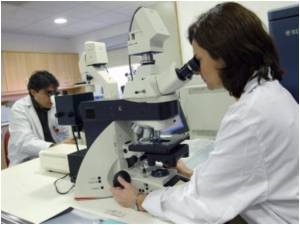Due to significant variability among tumors and diversity in human immune types, developing immunotherapies for cancer is challenging.

Tumor cells accrue mutations in their DNA, and as these mutations accumulate, the cell looks less and less like part of the body and more like a foreign invader to the immune system. Cancer patients with stronger anti-tumor immune responses, mediated by T cells, are more likely to live longer. Much research has focused on strategies to harness the immune system to fight cancer; however, it has been difficult to determine the tumor mutations that activate a patient's T cells because the mutations occur sporadically, and successful activation depends on the patient's immune type (specifically, their HLA type), which varies considerably from person to person.
In this new study, the authors used a collection of over 500 tumor samples to computationally predict, using both the mutation profile and the individual's immune type, which tumor mutations are likely to be "immunogenic," causing an immune response in the patient. They found that patients with one or more immunogenic mutations had higher expression of a known T cell marker, indicative of an anti-tumor T cell response. Furthermore, these patients had higher overall survival rates than patients without immunogenic mutations, suggesting the mutations are eliciting a protective immune response.
This study highlights the "personalized nature of the tumor-immune interaction" said the lead author of the study, Robert Holt. "Cancer immunotherapy is most likely to be successful if it is personalized, that is, targeted to each individual patient's immune type and mutation profile." With the decreasing cost of DNA sequencing, "it is now feasible to map these mutational profiles and design individual vaccines in relatively short order," Holt said.
Furthermore, the study demonstrates that tumors harboring large numbers of mutations are more likely to benefit from cancer immunotherapy, because they are more likely to have mutations that make the tumor susceptible to the immune system.
Holt added, "these results also support an entirely new approach to immunotherapy: creating personalized cancer vaccines that use tumor-specific immunogenic mutations to enhance anti-tumor immunity." The team is now looking to apply this strategy in combination with conventional cancer therapies.
Source-Eurekalert
 MEDINDIA
MEDINDIA




 Email
Email










